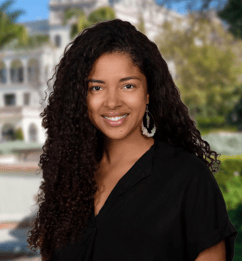At the Kroc School, our students are tasked with thinking about how to solve some of the world's most intractable and challenging problems. As a part of the Kroc Foundations course that every Kroc School student takes, we asked our students to identify the "Big Questions" that keep them up at night. Below is an excerpt from first year MA in Peace and Justice student Dan Mueller's contribution.
"One big question providing a surplus of food for thought is: does the system responsible for creating and exacerbating some of the worst issues and problems get to be the system that proposes solutions? Can it be the same system to which we entrust the righting of wrongs and the building of a more equitable, inclusive and just future? If we say yes, we encourage reform-centered approaches focused on rehabilitating the current capitalistic, colonial and patriarchal system and its many industrial complexes. If we say no, we acknowledge that radical, revolutionary change forges the necessary path forward. In reality, reform and revolution are kindred concepts for social change. How can we hold space for both? What responsibilities or obligations do these two factions have to build bridges and experiment with one another?"
Mueller goes on to describe the relationship between reformists and those seeking to abolish systems of oppression.
"Everyone knows the ancient riddle about the chicken and the egg, yet we tend to fixate on which came first. What we should really be opening up to is the idea that perhaps they came into existence at the exact same time. The chicken finds purpose and learns from the egg, while the egg receives protection and nourishment from the chicken. The same can be said about the relationship between reformists and revolutionaries. Those operating within the system can work to shift power and leverage positional privilege, while those with more radical agendas are free to experiment and given the space to operationalize their findings. Both are forces whose cooperation and collaboration with the one another are essential to achieving their respective goals. Abolition must then be realized as a common ground instead of a polarizing concept, driving wedges between advocates and activists."
What "Big Questions" keep you up at night? How do you plan to tackle them? Can the Kroc School help you make progress? Learn more about the Kroc School's MA in Peace and Justice program here to find out.
Dan Mueller is a first year student in the Kroc School's MA in Peace and Justice program. She is a community organizer and social healer with an aptitude for liberation and solidarity. Dan currently oversees Development at GRID Alternatives San Diego and is a part-time Equity, Inclusion & Justice Strategist for Slow Food USA.

Dan Mueller, MA in Peace & Justice Candidate

About the Author
The Joan B. Kroc School of Peace Studies (Kroc School) at the University of San Diego is the global hub for peacebuilding and social innovation. Founded in 2007, the Kroc School equips the next generation of innovative changemakers to shape more peaceful and just societies. We offer master's degrees in peace and justice, social innovation, humanitarian action, conflict management and resolution, and a dual degree in peace and law — programs that have attracted diverse and dynamic students from more than 50 countries. In addition to our graduate programs, the Kroc School is home to the Kroc Institute for Peace and Justice (Kroc IPJ). Founded in 2001, the Institute supports positive change beyond the classroom. Through groundbreaking research, experiential learning, and forward-thinking programs, the Kroc School and Kroc IPJ are shaping a future in which peaceful co-existence is the new normal.






